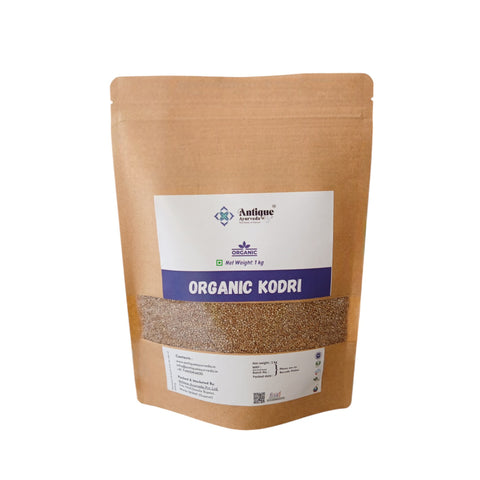
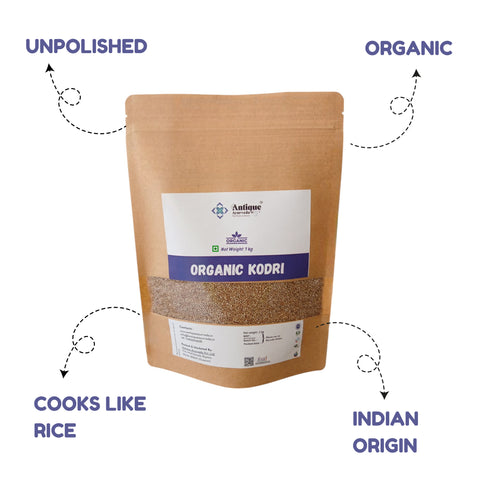
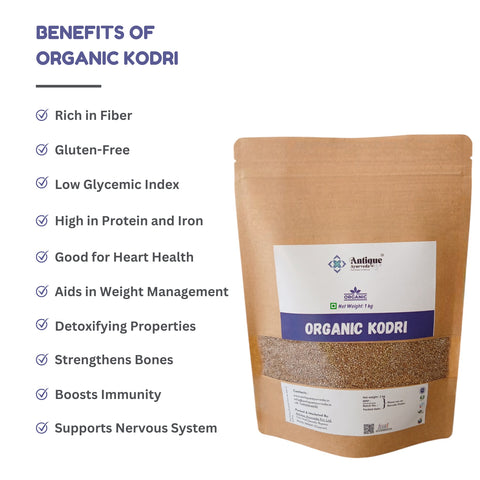
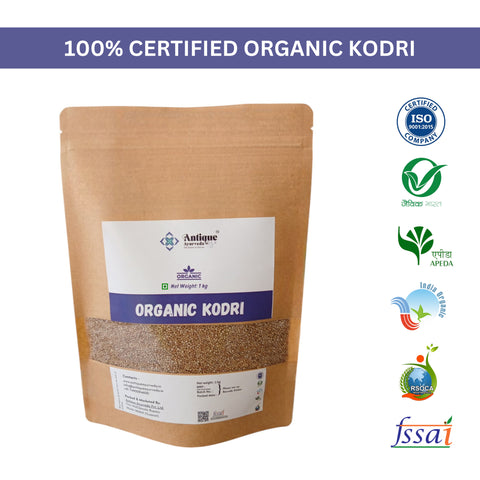
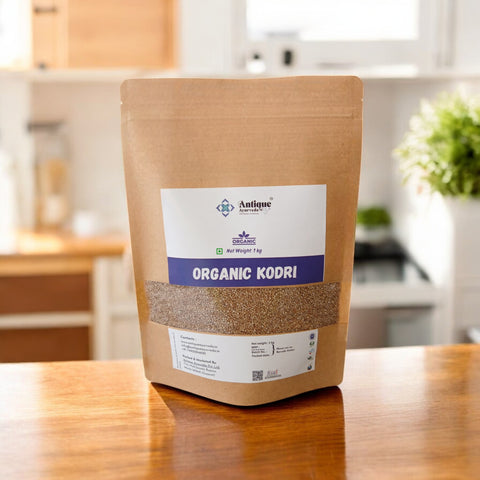
Organic Kodo Millet (Kodra) | Premium Drought-Resistant Ancient Grain
Use this code to get 10% discount
Product Description
Organic kodo millet is a small, nutrient-dense ancient grain that's naturally gluten-free and rich in protein, fiber, and minerals like iron and calcium. It's sustainably grown without synthetic pesticides or fertilizers, making it an eco-friendly choice that supports digestive health and provides sustained energy.
Drought-Resistant Wonder: Kodo millet stands as nature's most resilient grain, thriving in harsh climatic conditions where other crops fail. This remarkable ancient grain has sustained tribal communities across India for millennia, earning recognition as the ultimate climate-smart crop that combines exceptional nutrition with environmental sustainability.
Tribal Food Wisdom: Deeply rooted in indigenous knowledge systems, kodo millet represents thousands of years of tribal agricultural wisdom. This hardy grain has been the nutritional backbone of forest communities, providing complete nourishment while maintaining perfect harmony with nature's rhythms and ecological balance.
Climate-Smart Nutrition Benefits
100% Organic & Gluten-Free: Completely safe for celiac patients and gluten-sensitive individuals
Protein Powerhouse: Contains 8.3g high-quality protein per 100g with essential amino acids
Heart-Healthy Grain: Rich in magnesium and potassium supporting cardiovascular health
Diabetes Management: Low glycemic index helps maintain stable blood sugar levels
Bone Strengthening: Excellent source of calcium (27mg per 100g) and phosphorus
Iron Rich: Contains 0.5mg iron per 100g, supporting hemoglobin production
B-Vitamin Complex: Essential for energy metabolism and nervous system function
High Fiber Content: Promotes digestive health and satiety for weight management
Exceptional Nutritional Profile
Protein Excellence: 8.3g complete protein per 100g with balanced amino acid composition
Calcium Champion: 27mg calcium per 100g, higher than many other millets
Fiber Content: 9g dietary fiber per 100g supporting digestive and metabolic health
Heart Minerals: Rich in magnesium (147mg) and potassium for cardiovascular support
Iron Source: 0.5mg iron per 100g contributing to healthy blood formation
Phosphorus Content: 188mg phosphorus per 100g for bone health and energy metabolism
Moderate Glycemic Index: GI of around 65, better than refined grains for blood sugar control
Drought-Resistant & Climate-Smart Agriculture
Water-Wise Crop: Requires minimal water, thrives in drought conditions where other crops fail
Climate Resilience: Adapts to extreme weather conditions and climate variability
Sustainable Farming: Low input crop supporting eco-friendly agricultural practices
Soil Health: Improves soil fertility and prevents erosion in marginal lands
Carbon Sequestration: Contributes to carbon storage and climate change mitigation
Biodiversity Support: Preserves agricultural biodiversity and traditional crop varieties
Farmer Resilience: Provides reliable income to smallholder farmers in harsh conditions
Tribal Heritage & Traditional Wisdom
Indigenous Knowledge: Cultivated by tribal communities for thousands of years
Forest Communities: Primary grain for Adivasi populations across central India
Traditional Names: Known as Kodra, Varagu, Harka, and Arikelu in different regions
Cultural Significance: Integral part of tribal festivals and cultural celebrations
Survival Food: Sustained communities during famines and food scarcity
Medicinal Uses: Traditional use in folk medicine for various health conditions
Ecological Harmony: Cultivated in forest ecosystems without disturbing natural balance
Organic Excellence & Processing
Certified Organic: Grown without synthetic pesticides, fertilizers, or chemicals
Traditional Growing: Follows ancient tribal cultivation methods and practices
Natural Processing: Minimal processing preserves nutritional integrity and natural properties
Chemical-Free: No artificial treatments or preservation methods
Sustainable Sourcing: Supports tribal farmers and traditional agricultural communities
Quality Selection: Hand-sorted for uniform size and premium quality
Fresh Packaging: Packed immediately to preserve nutritional value and natural flavor
Health & Therapeutic Applications
Diabetes Control: Moderate GI and high fiber help manage blood sugar naturally
Heart Health: Magnesium and potassium support healthy cardiovascular function
Bone Strength: Calcium and phosphorus promote strong bones and teeth
Weight Management: High protein and fiber promote satiety and healthy metabolism
Digestive Health: Fiber supports beneficial gut bacteria and regular digestion
Energy Sustenance: Complex carbohydrates provide long-lasting natural energy
Anemia Support: Iron content helps prevent iron deficiency and supports blood health
Distinctive Culinary Applications
Traditional Preparations: Tribal recipes like kodra roti and porridge
Nutty Flavor Base: Distinctive taste enhances soups, stews, and grain bowls
Chewy Texture: Unique mouthfeel perfect for hearty, satisfying meals
Upma & Khichdi: South Indian breakfast and comfort food preparations
Pulao & Biryani: Aromatic rice substitute for special occasion dishes
Salad Base: Cooked and cooled for nutritious grain salads
Soup Thickener: Adds nutrition and body to broths and vegetable soups
Perfect Cooking Guide
Pre-Soaking: Soak kodo millet for 4-6 hours for better digestibility
Thorough Rinsing: Rinse multiple times until water runs clear
Water Ratio: Use 1:3 ratio (1 cup millet to 3 cups water) for proper cooking
Cooking Method: Bring to boil, reduce heat, simmer covered for 25-30 minutes
Pressure Cooking: 1:2.5 ratio with 4-5 whistles for quicker preparation
Texture Check: Properly cooked kodo should be tender with slight chewiness
Flavor Enhancement: Dry roast before cooking for enhanced nutty flavor
Ayurvedic Properties & Benefits
Dosha Balance: Balances Vata and Kapha doshas while being neutral for Pitta
Grounding Energy: Provides stable, nourishing energy for active lifestyles
Digestive Strength: Supports Agni (digestive fire) when prepared with spices
Sattvic Nature: Pure food promoting mental clarity and emotional balance
Strengthening Food: Builds physical strength and endurance naturally
Cooling Effect: Natural cooling properties beneficial during hot weather
Bone Tissue Support: Nourishes Asthi Dhatu (bone tissue) according to Ayurveda
Environmental & Social Impact
Climate Adaptation: Helps farmers adapt to changing climate conditions
Water Conservation: Requires 70% less water than rice cultivation
Tribal Empowerment: Supports indigenous communities and traditional knowledge
Sustainable Agriculture: Promotes eco-friendly farming practices
Food Security: Provides nutrition security in drought-prone regions
Biodiversity Conservation: Preserves ancient crop varieties and genetic diversity
Carbon Footprint: Lower environmental impact compared to water-intensive crops
Storage & Quality Maintenance
Storage Guidelines: Store in cool, dry place in airtight containers
Pest Prevention: Keep sealed to prevent insect infestation
Shelf Life: 12-18 months when stored properly in optimal conditions
Quality Indicators: Fresh kodo has uniform color and mild, nutty aroma
Moisture Control: Protect from humidity to prevent spoilage
Pre-Cooking Storage: Soaked millet should be cooked within 24 hours
Cooked Storage: Refrigerate cooked kodo for up to 3-4 days
FAQ
A: Antique Ayurveda's organic kodo millet for authentic, drought-resistant Kodra that honors tribal food wisdom while delivering superior heart-healthy nutrition and environmental sustainability.
A: Buy certified organic kodo millet from Antique Ayurveda, offering premium quality Kodra sourced from traditional growing regions across India, ensuring authenticity and nutritional integrity.
A: Kodo millet is unique for its exceptional drought resistance, distinctive nutty flavor, chewy texture, and higher calcium content (27mg per 100g) compared to many other millets. It's also one of the most climate-resilient grains, requiring minimal water for cultivation.
A: Yes, kodo millet is excellent for diabetes management. With a low glycemic index (around 65), high fiber content that slows sugar absorption, and complex carbohydrates that provide steady glucose release, it helps maintain stable blood sugar levels.
A: Soaking kodo millet for 4-6 hours improves digestibility, reduces cooking time, and enhances nutrient absorption. The soaking process also helps achieve the perfect chewy texture that kodo is known for.
A: Yes, kodo millet can be consumed daily as part of a balanced diet. Its high protein, fiber, and mineral content make it an excellent staple grain for regular consumption.
